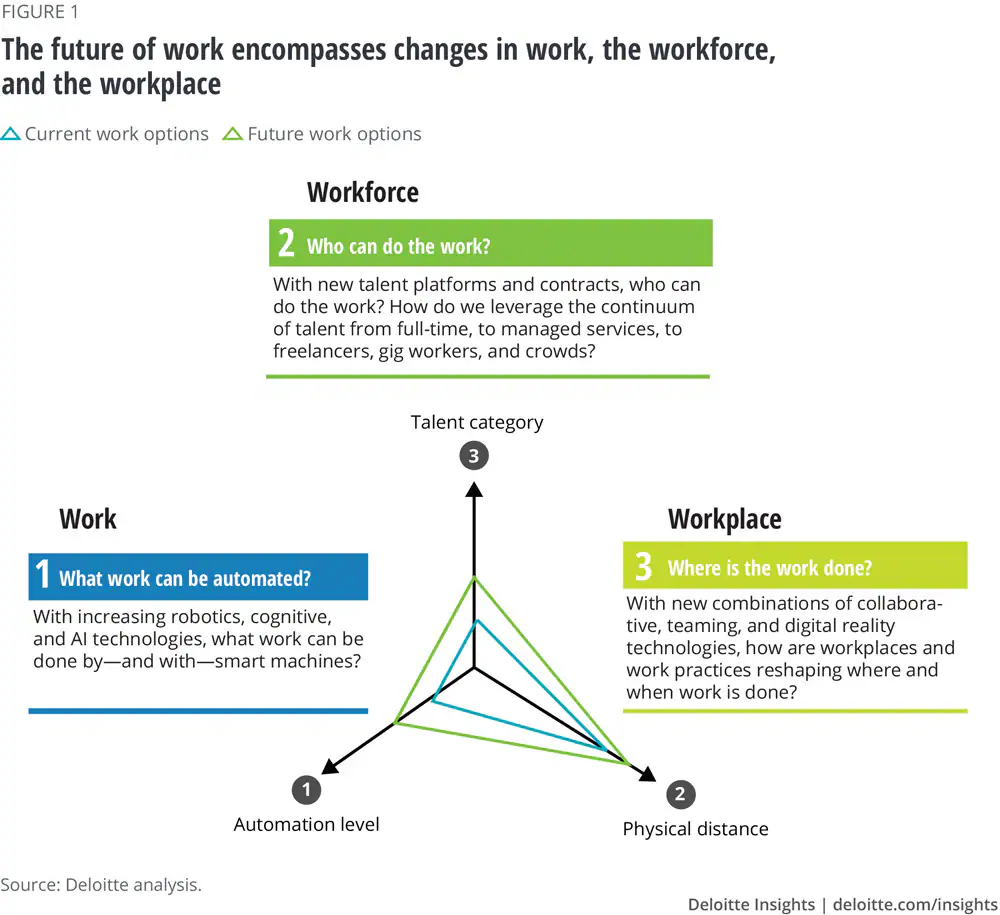
How Successful Leaders Deal with an Uncertain Future
The future is constantly in flux. Executives face more uncertainty than ever, creating a more complicated spectrum of leadership challenges from rapidly evolving technology to a transforming workforce to overcoming environmental energy transformation.
We chatted with Stephan Meier, co-director of the Executive Development Program: Leading into the Future, to get his insights into the future of work and how leaders can successfully navigate through uncertainty.
The Future of Work
With major changes coming to technology, digitalization, and automation, executives need an updated framework on how to successfully navigate forward. Professor Meier shared a fundamental framework he calls the Learning Executives Framework, co-developed with Professor Dan Wang, that affects how leaders think about their future employees, their competition, and managing the future of work.
The future of work is decomposed into three parts that affect how we think about work (as seen in this slide from Deloitte):

- What activities are humans doing?
- What are machines doing?
- How is the interaction between humans and machines?
This affects how leaders need to think about their future workforce including what skills are needed and how to upskill employees. Careers are going to be very different in the future because the half-life of knowledge and skills decreases so rapidly that within a couple of years what workers previously learned will have to be reimagined.
The future of work also extends from the workforce to the workplace. Will the future of work be onsite, remote, hybrid, or a combination of all three? Currently, there is a lot of uncertainty. Some companies, like Morgan Stanley, find being in person works best. Hybrid and remote don't work as well for their needs. Whereas some tech companies would like to be all remote in the future. Then there are the companies that fall in between where it's a mix of in person, hybrid, and remote. The future of work and the workplace is still in flux.
Reimagining the Future of Work
Reimagining the workplace forces us to ask three important questions:
- When do we do the most productive work?
- Where do we do the most productive work?
- How do we do the most productive work?
We experienced during the pandemic that performing certain tasks remotely was more effective than in person. While the traditional model was working in the office from nine to five, now we can think about unconstrained time. Does it matter that we have synchronous collaboration? Does it matter that we are in the office at the same time or can we come at any time? Does it matter where we are? Do we need to have synchronous time where we work together on Zoom or can we do work anywhere at any time? What management and leadership practices need to change?
During the pandemic, we also learned that what we did before does not work in a remote or even in a hybrid workplace. We need to think differently about how we should lead whether leading small teams or a large organization. What data do I need? Pre-pandemic, it was clear that employees were mostly available nine-to-five. Now, the employee experience has changed. Some people prefer working earlier while some prefer working later. What data do you need to get that deeper understanding? During the pandemic, the number of emails that were sent between 6 p.m. and midnight increased by 52 percent. Do you know when your employees actually interact? In a consumer business, you wouldn't ask your customers once a year how they're doing and what they're doing. That's exactly what we currently do with our employees. Most company data points on employees come from a once-a-year engagement survey. That needs to change.
Nine Key Strategies for the Future of Work
In today's world, there is great uncertainty. With all the rapid change, it can feel like a new world almost every day. To gain a competitive advantage in the future, Professor Meier suggests the following:
1. Embrace the Learning Mindset
One of the most critical strategies for leaders to embrace is the learning mindset, a concept popularized in recent years by Microsoft CEO Satya Nadella. The learning mindset encourages continuous pursuit of new knowledge to improve and evolve. By adopting a learning mindset, executives can foster and create an environment where they and their teams are open to change and challenge, eager to innovate, and prepared for whatever challenge the future holds.
2. Leverage Emerging Technologies
The rise of technology has dramatically impacted the way businesses operate. Executives must be proactive in exploring and leveraging emerging technologies to streamline processes, enhance communication, create, and optimize efficiency. It's important to stay informed about the latest technology advancements, such as artificial intelligence, blockchain, and big data, and incorporate these advancements into their organizations.
3. Navigate Geopolitical Challenges
In a globalized world, geopolitical events can have far-reaching consequences on businesses. As such, executives must be well-versed in the current geopolitical landscape and be prepared to adapt their organizational structures and strategies accordingly. Executives should consider the potential impact of global events on their business and develop contingency plans to mitigate risks and seize opportunities.
4. Foster Inclusive Leadership
As the workforce becomes more diverse, executives must adopt inclusive leadership strategies to effectively manage generational diversity within their organizations. It is important for leaders to recognize and embrace differences, encourage collaboration, and promote a culture of continuous learning. This helps create an inclusive environment where everyone feels that they belong, feels valued, and are empowered to contribute.
5. Prioritize Environmental and Social Responsibility
Modern businesses must navigate the growing importance of environmental and social responsibility within most organizations. Executives are urged to prioritize sustainability and corporate social responsibility (CSR) initiatives within their organizations, as these efforts not only benefit the natural environment and society but also enhance a company's reputation and long-term viability.
6. Manage Remote and Hybrid Workforces
The COVID-19 pandemic has permanently altered the way we work, with many organizations embracing remote or hybrid work models. Executives are encouraged to develop strategies for effectively managing remote teams, ensuring clear communication, and fostering their teams' success through the support of a positive company culture, even when employees are not physically present in the office.
7. Adapt to Changing Consumer Demands
As consumer preferences and expectations evolve, businesses must adapt to meet these changing demands. Executives should stay informed about market trends, regularly reassess their company’s product and service offerings, and be willing to pivot their strategies when necessary to remain competitive and relevant in the marketplace.
8. Invest in Education and Executive Development Programs
Education is paramount in navigating and leading the changing business landscape not only for a leader's own development but also for leading their team. The Executive Development Program: Leading into the Future is specifically designed for seasoned professionals, offers an opportunity to refine leadership skills, learn new strategies, and network with other like-minded executives.
9. Build a Resilient and Adaptable Organization
It's important for executives to build a resilient and adaptable organization, capable of weathering the storms of change. By fostering a culture of agility, collaboration, and innovation, executives can ensure their organizations remain competitive and prepared for the challenges and opportunities that lie ahead.
Embrace the Future
The world of business is changing at an unprecedented pace. Organizations and executives must adapt their leadership strategies to thrive and lead in this new environment. By embracing a growth mindset, business leaders can navigate the complexities of the modern world with confidence and success.
With the Executive Development Program: Leading into the Future, business leaders gain access to essential steps and resources, empowering them with the knowledge and tools needed to succeed in a rapidly transforming world. Learn more on how this program fosters innovation and strategic growth, empowering leaders to navigate the evolving business landscape:
Upcoming Executive Development Program
$30,500
Sign Up for Email Alerts
Sign up for program updates and content relevant to today's business leaders from Columbia Business School Executive Education.
